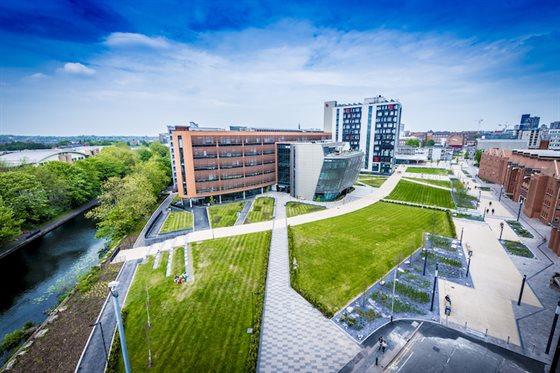De Montfort University Leicester (DMU) has halved its energy-related carbon emissions one year ahead of target, announced in its latest sustainability report.

The new report, being unveiled at the Sustainable Development Goals (SDGs) Conference today (Friday 23 October) highlights the continuous progress in many areas of DMU’s work to achieve its sustainability goals including, recycling, carbon emissions, teaching and learning.
New statistics show DMU has recycled 91% of its non-residential waste since the last report and has also been ranked in the top 50 universities in the world for sustainability in the Times Higher Education rankings.
Karl Letten, DMU’s Sustainability Manager said: “Improving any organisation’s sustainability performance is about focusing on the core activities. For DMU that is our teaching and our research.
“The sustainability report, is a snapshot of our progress to date, on embedding sustainability right across the university, in all its activities and operations.”
DMU has been working closely with the United Nations (UN) to pursue the UN’s 17 Sustainable Development Goals (SDG). The goals articulate a series of global challenges to tackle issues like poverty, environmental health and equality.
For its work to support these goals, the DMU was made the global hub for SDG 16, which focuses on promoting peace, justice and strong institutions.
In addition, DMU has been recently nominated for four Green Gown awards, which celebrates the work being done in universities and colleges to tackle climate change and promote sustainability. It was recognised for its carbon literacy teaching, sustainable improvements to its campus, embedding the SDGs in its curriculum and research to improve sustainability in the textile trade
The report also details that in the past year, DMU has gained an accreditation to the National Union of Students’ Responsible Futures programme, which recognises UK universities who are working to embed issues around sustainability and social responsibility within curricula across all faculties.
Karl said: “Responsible Futures provide a structured framework for embedding sustainability into teaching and learning.
“Achieving an accreditation through Responsible Futures and the external audit we received as part of that, is testament to the great work that academics at DMU are doing to embed sustainability into their teaching.”
DMU is currently the lead higher education institute in the UN’s Together campaign, leading universities around the world to help achieve their SDGs through research, community work and academic teaching.
Looking at future goals for the university, Karl said: “Our focus for the next year and beyond will be to address the climate emergency.
“The university has acknowledged the climate emergency and made a series of commitments to reduce its own emissions and to work with local partners to reduce emissions within the city of Leicester.”
He added: “One of the main goals for the university moving forward is to be net carbon zero from its energy use by 2032 and net carbon zero from all other emissions by 2045.
“The report itself is reflecting on our past performance, which has been really good, but the universities commitment doesn’t end there.
“The commitment to becoming net carbon zero is a testament to how import the university thinks sustainability is and how important it is to our students and their future careers.”
As part of its continuous drive, DMU is committed to engage with staff and students on climate change issues and is currently in the process of drawing up a new sustainability strategy looking at how the university will transform itself to achieve future goals.
.
Posted on Friday 23 October 2020